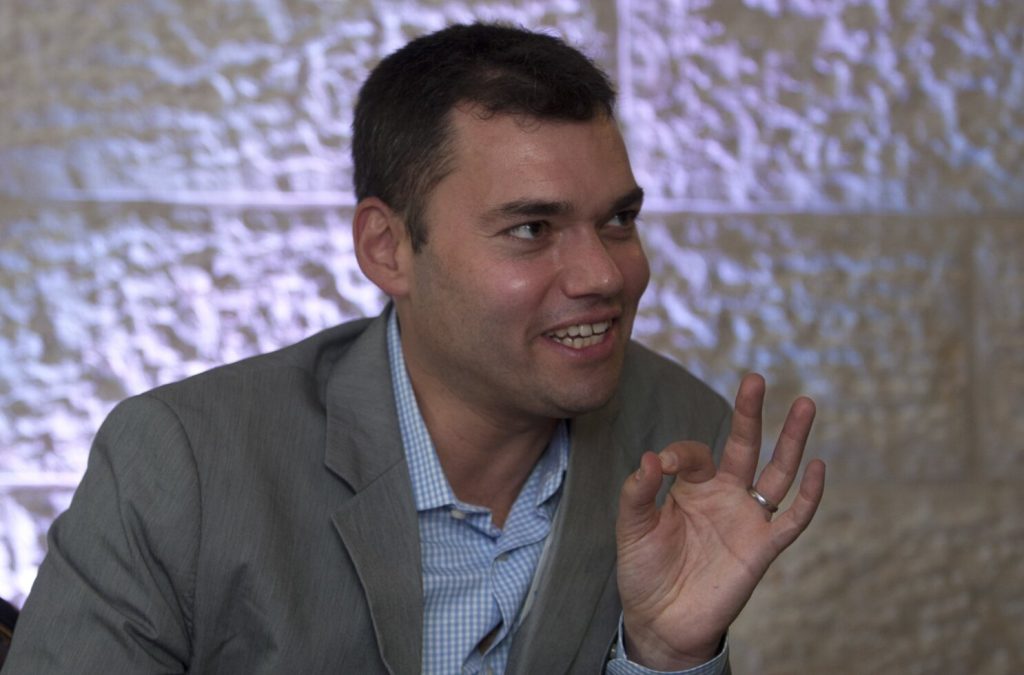
by Lev Tsitrin
Peter Beinart, “a professor of journalism and political science at the Newmark School of Journalism at the City University of New York” is apparently losing sleep worrying of “What Will Happen to Gaza’s People?”
His fear, expressed in a New York Times’ eponymous “guest essay” is of the “the voluntary resettlement of Palestinians in Gaza, for humanitarian reasons, outside of the Strip.”
Mr. Beinart finds the idea abhorrent, surprises me — because Mr. Beinart positions himself as a bleeding-heart humanitarian. As he looks at a situation in which “an estimated 85 percent of Gaza’s people are now displaced. Even if they could return to their homes, many would have little to go back to since, according to an analysis by The Wall Street Journal, nearly 70 percent of Gaza’s housing is damaged or destroyed. … According to the Gaza director of affairs for the United Nations Relief and Works Agency, 40 percent of the Strip’s residents are at risk of famine. Given the collapse of Gaza’s sanitation and medical systems, as much as a quarter of Gaza’s people could die within the year, mostly from disease or lack of access to medical care, according to a recent estimate by Prof. Devi Sridhar, chair of global public health at the University of Edinburgh,” Mr. Beinart — the great humanitarian — ardently objects to Palestinian immigration, even after acknowledging that “Israel’s war in Gaza would “last for many more months .. [or] could take years.” In Mr. Beinart’s humanitarian mind, Palestinian misery and starvation in Gaza is preferable to their living well elsewhere. He is some humanitarian, this Mr. Beinart!
That’s not the end of Mr. Beinart’s hypocrisy — after all, he is an American, and America is a country of immigrants — the land of descendants of those who found their native country less than livable, and moved out. One would expect that to him, the benefit of the ability to migrate should be a given — and in fact I very much doubt that his abhorrence migration is a principled position. Is Mr. Beinart a “blood and soil” nativist? Is he a firm opponent of illegal immigration to the US? Is he one of the “build the wall!” people? Does he use his connections at the New York Times to trumpet from its pages, loud and clear, his warnings against the dangers of Mosem immigration to Europe?
Not that I know of. So what is wrong with Palestinians allowed to move to where they won’t live in misery and danger?
It makes perfect sense, yet somehow, Mr. Beinart just doesn’t like that idea. His bleeding-heart humanism is highly selective, and seems Hamas-ized, as it were: while the borders of Western democracies should be wide-open to let in all of the world’s oppressed, Gazans should be locked in southern Gaza, pressed against the impregnable Egyptian border, smearing Israel in “having created the conditions that precipitated” the possibility of “as much as a quarter of Gaza’s people dying within the year.” The highly humane Mr. Beinart thinks of Palestinians exactly the way Hamas does — not as humans, but as a mass to be used in the war against Israel: Palestinian deaths are but a welcome boost for Hamas’ (and Mr. Beinart’s ) anti-Israel cause.
Which points to yet another trait of Mr. Beinart’s: not only is he a hypocrite, but a liar too: contrary to what he tells us, it is Hamas that started the war and precipitated the present conditions for the Palestinians, and not Israel which merely fights back. Everyone knows it — except for Mr. Beinart (and the dear editor of the New York Times’ editorial page who accepted his screed for publication). But propaganda ends justify propaganda means — for Mr. Beinart, a lie is but a useful tool in a war against Israel. Facts don’t serve this noble purpose, and are discarded accordingly.
If he were honest, Mr. Beinart could have at least told us a bit more about the reasons why the idea of Palestinian immigration is not popular in the Middle East, and why Egypt doesn’t want them. He could tell us how Palestinians are not content to set roots and live normal lives in the host countries, but have to subvert their governments, and take them over — in Jordan, from which they were expelled after trying to depose King Hussein in 1970 in the events that are known a the Black September, in Lebanon which Palestinians used as a bridgehead to attack Israel causing Israeli invasion, in Kuwait which expelled its Palestinians after Arafat supported Saddam’s invasion of their country. It is said that the Arabs love Palestinian cause, but not the Palestinians — a fact that Mr. Beinart, this great humanitarian, politely omits.
The editorial pages of the New York Times are no stranger to anti-Israeli drivel (Thomas Friedman and Nicholas Kristoff being acknowledged masters of the genre, and regular purveyors), and Peter Beinart is a worthy supporter of the tradition. The question is whether it is a tradition worth keeping, and whether hypocrisy and lies necessary to maintain it add luster to the paper’s reputation. I, for one, don’t think so — but there are so many out there who want to be fooled by the likes of Peter Beinart. Being subscribers, they pay the piper — and so, order the music I guess. Too bad that this music is a screech.
- Like
- Digg
- Del
- Tumblr
- VKontakte
- Buffer
- Love This
- Odnoklassniki
- Meneame
- Blogger
- Amazon
- Yahoo Mail
- Gmail
- AOL
- Newsvine
- HackerNews
- Evernote
- MySpace
- Mail.ru
- Viadeo
- Line
- Comments
- Yummly
- SMS
- Viber
- Telegram
- Subscribe
- Skype
- Facebook Messenger
- Kakao
- LiveJournal
- Yammer
- Edgar
- Fintel
- Mix
- Instapaper
- Copy Link








